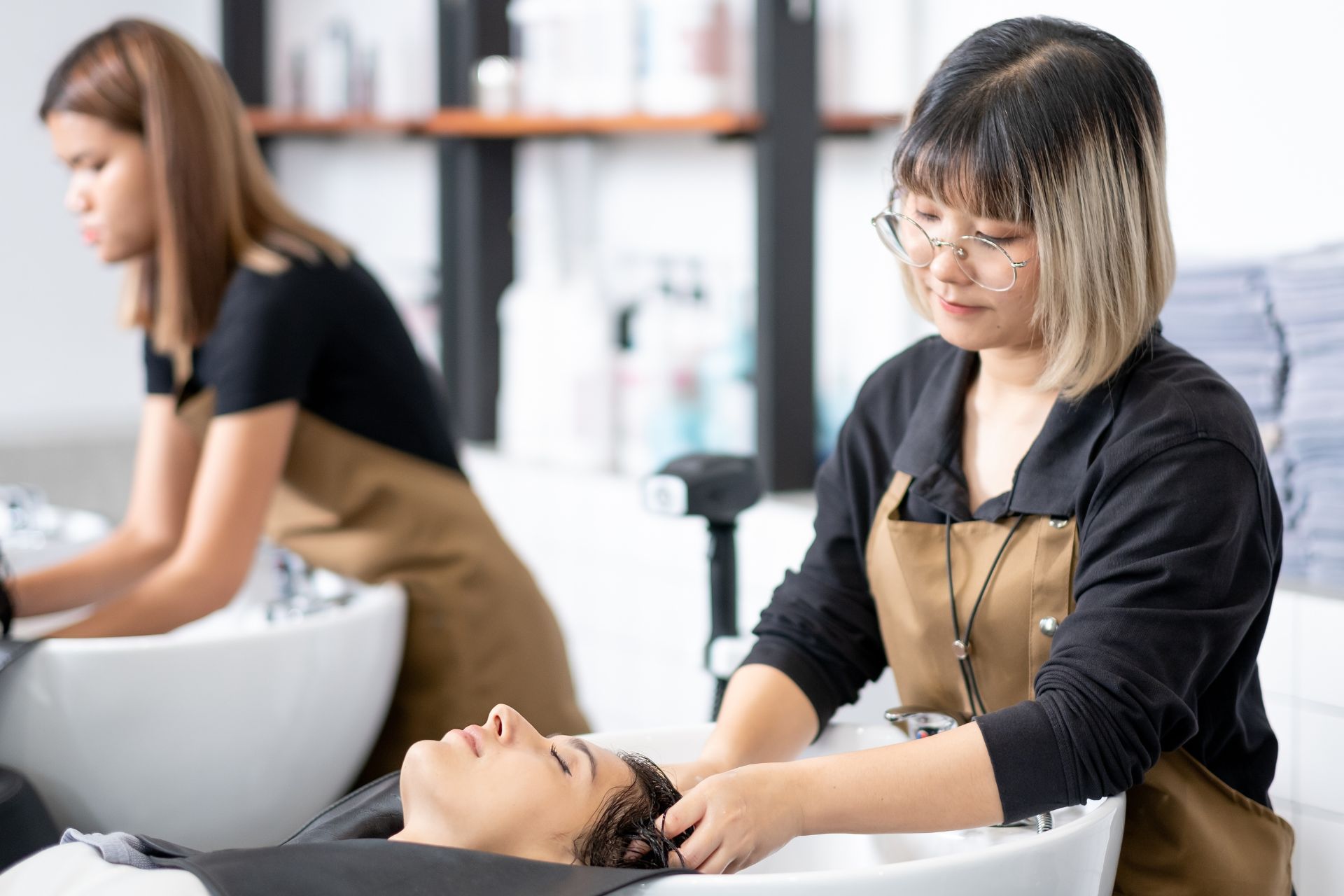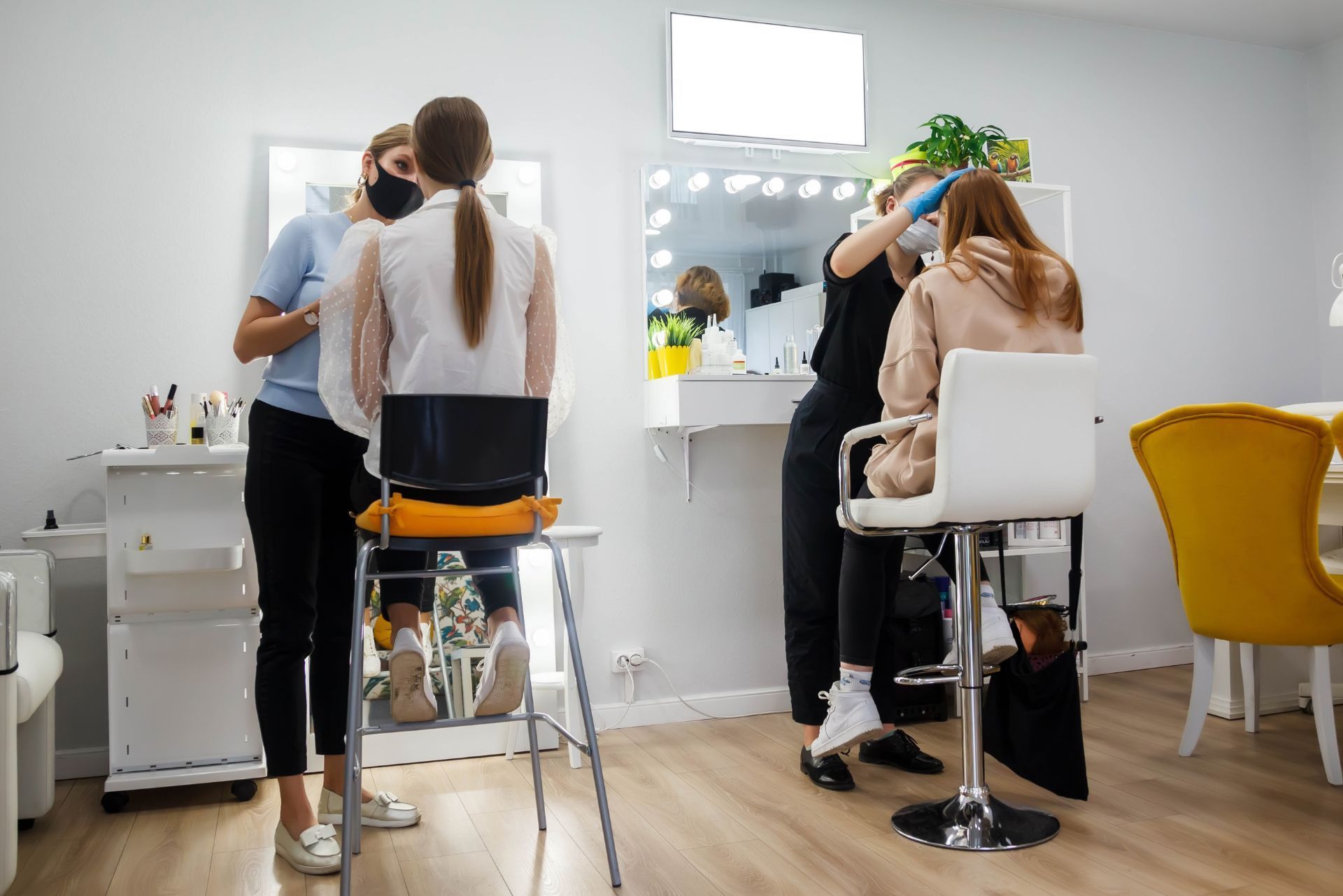
Index
Operating a beauty salon in Michigan comes with exciting opportunities but also unique risks. From client injuries to property damage and even insurance fraud, salon owners must navigate a complex landscape to protect their businesses. Understanding the essentials of beauty salon insurance in Michigan is critical for safeguarding your livelihood and ensuring long-term success.
With the beauty industry showing signs of recovery and growth, as 65% of salon professionals reporting their business is on the road to recovery, now is an ideal time to review your insurance needs. This guide covers everything from common risks and coverage options to industry trends impacting insurance in Michigan’s beauty salons.
Understanding the Risks Facing Michigan Beauty Salons
Beauty salons face a variety of risks that can disrupt operations and lead to costly claims. One of the most significant concerns is client injury. According to industry data, 42% of salons reported at least one client injury incident in the past two years. These injuries can range from allergic reactions to burns or cuts, making comprehensive liability insurance essential. Salons must also be aware of the specific products they use, as certain chemicals can provoke severe allergic reactions in sensitive clients, further emphasizing the importance of thorough client consultations and patch tests.
Additionally, property damage from fire, water, or theft can cause major financial setbacks. The beauty industry often relies on expensive equipment and inventory, increasing vulnerability to losses. Another less obvious but growing threat is insurance fraud, which accounts for about 10% of property-casualty insurance losses annually nationwide. Michigan salon owners must be vigilant about potential fraudulent claims that could impact premiums and coverage availability (michigan.gov). Moreover, the rise of social media has led to an increase in public scrutiny, where negative reviews or viral incidents can quickly escalate, putting salons at further risk of reputational damage and subsequent financial loss.
Why Liability Insurance is Crucial
Liability insurance protects salons if a client sues for injuries sustained on the premises or due to services provided. Given the high incidence of client injuries, this type of coverage is often mandatory for salons and cosmetologists in Michigan. Without it, legal fees and settlements could cripple a small business financially. Additionally, salons should consider investing in umbrella insurance, which provides an extra layer of protection beyond standard liability limits, ensuring that they are safeguarded against large claims that could arise from serious incidents.
Other Common Risks
Besides liability and property risks, salons must consider employee-related exposures such as workers’ compensation claims. Michigan’s small business owners are already feeling the pinch from rising health care costs, with a majority unable to expand their workforce due to insurance expenses (bridgemi.com). Employee injuries can occur in various ways, from slips and falls to repetitive strain injuries from performing the same tasks repeatedly. Therefore, salons should prioritize employee training and safety protocols to minimize these risks, fostering a safer work environment while potentially lowering insurance premiums.
Understanding these risks helps salon owners select the right insurance policies tailored to their unique needs. Furthermore, engaging with an insurance broker who specializes in the beauty industry can provide valuable insights into the specific coverage options available, ensuring that salon owners are adequately protected against the myriad of challenges they may face in their day-to-day operations.
Key Insurance Policies for Michigan Beauty Salons
Choosing the appropriate insurance coverage can be overwhelming, but several core policies are essential for beauty salons in Michigan.
General Liability Insurance
This is the foundation of any salon’s insurance portfolio. It covers bodily injury, property damage, and personal injury claims from clients or third parties. For instance, if a client slips and falls or experiences an allergic reaction to a product, general liability insurance can cover medical expenses and legal costs. Additionally, this policy can also protect against claims arising from advertising injuries, such as slander or copyright infringement, which can be particularly relevant in the beauty industry where marketing and promotions are key to attracting clients.
Professional Liability Insurance
Also known as malpractice insurance, this protects against claims of negligence or errors in the services provided. Given the nature of beauty treatments, mistakes can happen, and this coverage helps mitigate the financial impact of lawsuits. For example, if a stylist misapplies a chemical treatment resulting in damage to a client’s hair or skin, professional liability insurance can cover the costs associated with corrective measures and potential legal fees. This type of insurance not only provides peace of mind but also enhances the salon's reputation by demonstrating a commitment to professional standards and client safety.
Property Insurance
Property insurance covers damage to the salon’s physical location and contents, including equipment, furniture, and inventory. This is vital for salons that have invested heavily in technology, such as the growing number of businesses adopting AI-powered skin analysis tools (zipdo.co). Furthermore, property insurance can also cover losses due to theft or vandalism, which can be particularly concerning in urban areas. Salons often house expensive equipment and products, making them attractive targets for criminals, and having this coverage can significantly ease the financial burden of such unfortunate events.
Workers’ Compensation Insurance
Required by Michigan law for businesses with employees, this insurance covers medical expenses and lost wages if an employee is injured on the job. It also protects salon owners from lawsuits related to workplace injuries. In the beauty industry, employees are often exposed to various risks, from slips and falls to repetitive strain injuries from performing the same tasks over time. By investing in workers' compensation insurance, salon owners not only comply with legal requirements but also foster a safer work environment, which can lead to increased employee morale and retention.
Business Interruption Insurance
This coverage helps salons stay afloat if forced to close temporarily due to a covered event like a fire or natural disaster. It can cover lost income and ongoing expenses during the downtime. For salons located in areas prone to severe weather, such as Michigan's harsh winters, this insurance can be a lifesaver. It ensures that salon owners can continue to pay their employees and manage their bills even when business operations are halted, allowing them to bounce back more quickly once they are able to reopen their doors.
Cyber Liability Insurance
With salons increasingly using digital tools and storing client data, cyber liability insurance is becoming more relevant. It protects against data breaches and cyberattacks that could compromise sensitive information. As salons often collect personal information from clients, including payment details and health histories, the potential for data breaches poses a significant risk. Cyber liability insurance not only covers the costs associated with recovering from a breach but also provides resources for improving data security measures, helping salons safeguard their clients' information and maintain trust in their services.

Industry Trends Impacting Salon Insurance in Michigan
The beauty salon industry in Michigan is evolving rapidly, influencing insurance needs and costs.
Growth of Beauty Salons and Employment
The number of beauty salons in Michigan increased from 82,000 in 2019 to 92,000 in 2023, reflecting a robust market expansion (businessresearchinsights.com). Employment in hair care services is also projected to grow 13% from 2022 to 2032, faster than the average for all occupations (zipdo.co).
This growth means more salons seeking tailored insurance solutions to address their expanding risks and regulatory requirements. As the industry flourishes, salons are also diversifying their service offerings, including specialized treatments like organic hair coloring and advanced skincare services. This diversification not only attracts a broader clientele but also necessitates comprehensive insurance coverage that can adapt to new service-related liabilities and potential claims.
Rising Costs of Personal Care Services
Consumer prices for haircuts and personal care services rose 3.8% in July 2025 compared to the previous year (verticaliq.com). This price increase reflects inflationary pressures and higher operating costs, including insurance premiums.
Salons need to balance these rising costs while maintaining competitive pricing and adequate insurance coverage. As the cost of supplies and labor continues to climb, many salons are exploring innovative pricing strategies, such as subscription models or bundled service packages, to retain customers while managing expenses. Additionally, salons are increasingly investing in employee training to enhance service quality, which can further impact their insurance needs as they navigate the complexities of liability and worker’s compensation.
Technological Advancements
About 35% of beauty salons adopted new technologies like AI-powered skin analysis tools in 2023
(zipdo.co). While these tools enhance client service and operational efficiency, they also introduce new risks related to equipment damage and data privacy, prompting salons to reconsider their insurance policies.
How to Choose the Right Insurance Provider in Michigan
Selecting an insurance provider that understands the beauty salon industry and Michigan’s regulatory environment is crucial.
Look for Industry Expertise
Insurance companies specializing in salon and cosmetology coverage are better equipped to tailor policies that address specific risks such as client injuries, equipment breakdown, and professional liability. These providers often have a deep understanding of the unique challenges faced by salon owners, such as the need for specialized equipment insurance and coverage for aesthetic procedures that may carry additional risks. Furthermore, they may offer resources and guidance on compliance with Michigan’s specific regulations, ensuring that your salon operates within the legal framework while minimizing potential liabilities.
Evaluate Coverage Options and Limits
Ensure the policy limits are sufficient to cover potential claims. For example, given the frequency of client injuries, liability coverage should be robust enough to handle medical and legal expenses. Additionally, consider the importance of business interruption coverage, which can protect your income in the event of unforeseen circumstances such as a natural disaster or a pandemic. In Michigan, where harsh winters can lead to property damage, having a comprehensive plan that includes coverage for loss of income during downtimes can be a lifesaver for salon owners.
Consider Cost and Affordability
While cost is important, it should not be the sole factor. Michigan’s small business owners are already challenged by rising health care costs, which affect their ability to expand and maintain staff (bridgemi.com). Finding a balance between comprehensive coverage and affordable premiums is key. It may be beneficial to explore discounts for bundling multiple policies or for maintaining a claims-free history. Additionally, some providers offer flexible payment plans that can ease the financial burden while ensuring you have the necessary coverage to protect your business.
Check for Fraud Prevention Measures
Given that insurance fraud accounts for a significant portion of losses, working with providers who actively combat fraud can help keep premiums stable and claims processes transparent (michigan.gov). Look for companies that invest in technology and training to detect and prevent fraudulent claims, as this can directly impact your bottom line. Additionally, inquire about the claims process and how the provider handles suspicious claims, as a proactive approach can save you time and money in the long run.
Read Reviews and Seek Recommendations
Talking to other salon owners and reading customer reviews can provide insights into the responsiveness and reliability of an insurance company. Online platforms and social media groups dedicated to salon professionals can be invaluable resources for gathering feedback on different providers. Furthermore, consider reaching out to local business associations or chambers of commerce, as they often have recommendations based on collective experiences. Engaging in these discussions can help you gauge not only the quality of the coverage but also the level of customer service you can expect from the insurance provider.

Conclusion: Protecting Your Michigan Beauty Salon for the Future
Michigan’s beauty salon industry is vibrant and growing, but it comes with inherent risks that require careful insurance planning. From the high incidence of client injuries to the evolving technological landscape and rising costs, salon owners must be proactive in securing comprehensive insurance coverage.
By understanding the specific risks, selecting the right policies, and partnering with knowledgeable insurance providers, Michigan beauty salons can protect their businesses and continue thriving in a competitive market. Staying informed about industry trends and regulatory changes will also help salon owners adapt their insurance strategies effectively.
For salon owners looking to safeguard their investments and ensure peace of mind, now is the time to review and update insurance coverage tailored to Michigan’s unique beauty industry landscape.

